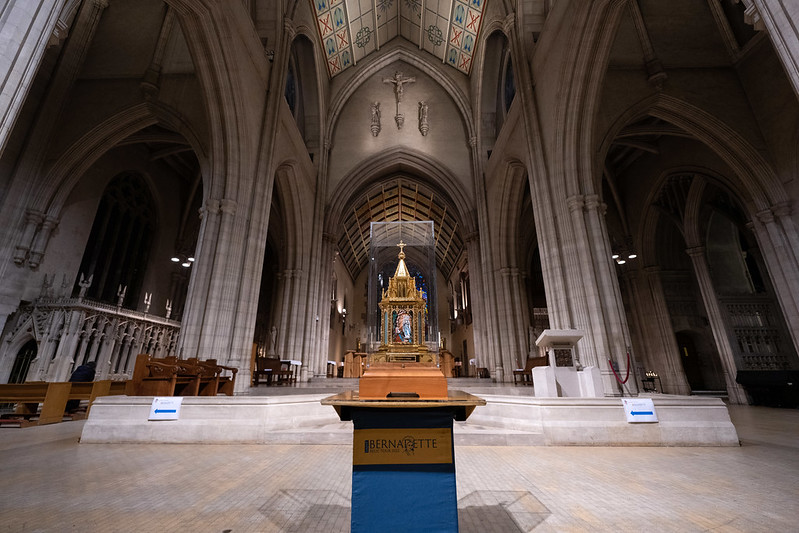Waverley Abbey, a site of prayer and monasticism in Farnham, Surrey for more than a thousand years, is to be transformed into a hub of Christian encounter, education, enterprise and community engagement in a joint venture between two charities to build on the site’s historic legacy. CWR, a charity providing Christian higher education, learning and resources, will partner with international, interdenominational prayer movement 24-7 Prayer to create Waverley Abbey Trust on the site overlooking and around the ancient abbey in Farnham, Surrey. Plans will also see a Christian university that builds on the success of Waverley Abbey college, a centre of enterprise for ethical businesses that will fund and further the vision of the Abbey, and a centre of mission engagement. Pete Greig, the founder of 24-7 Prayer said: “This isn’t just about looking backwards, although historically Waverley Abbey is a place of extraordinary prayer. This is about the future – a new abbey for a new generation. Our vision for this site is to revive the heart of the abbey by establishing here a house of prayer for all nations, a new Christian university and a hive of gospel endeavour.” The project will be supported by Ken Costa, the new chair of the Board of Waverley Abbey Trust and chairman emeritus of Alpha International.
The relics of St Pio of Pietrelcina are visiting the Diocese of Down and Connor from 6 to11 November. The relics are being brought to Northern Ireland by the Saint Pio Foundation to mark 20 years since Pope Saint John Paul II declared the Italian friar a saint. They will visit St Peter’s Cathedral, Belfast, All Saints’ Church, Ballymena and St Patrick’s Church, Downpatrick. The Saint Pio Foundation was founded by Luciano and Valentina Lamonarca who ascribe the birth of their son Sebastian, following multiple miscarriages, to a miracle through the intervention of Padre Pio.
The Church of Scotland has named the former head of Christian Aid in Scotland, Sally Foster-Fulton, as the Moderator of the Church’s General Assembly in 2023-2024. Foster-Fulton, aged 58, was born in South Carolina, the United States, and has served as a Church of Scotland pastor across multiple parishes, hospitals and social initiatives. The current moderator, Iain Greenshields, will remain in post till May next year.
A priest who was stabbed six times in a violent unprovoked attack in Waterford city has been released from hospital. Bishop Phonsie Cullinan appealed for prayers for the cleric, who is in his 30s, and for the man who perpetrated the crime. The incident took place on Sunday morning at a chaplains’ house located beside University Hospital Waterford, where three priests live. The attacker reportedly gained access to the house after escaping from the department of psychiatry at the hospital early on Sunday morning. The injured priest was wounded in the face, head and in the back.
Vatican diplomat Archbishop Patrick Coveney who served as Apostolic Nuncio to a number of countries before he retired to his native Cork in 2009, died on 22 October 2022 aged 88. After ordination in 1966, the then Fr Coveney joined the Secretariat of State in the Vatican before he entered the Pontifical Ecclesial Academy in 1969. He later served in Argentina, India, Sudan, Zimbabwe, Mozambique, Ethiopia and Djibouti. In 1996 Archbishop Coveney was appointed as Apostolic Nuncio to New Zealand. During this period he also served as Apostolic Nuncio to Samoa, Tonga, Marshall Islands, Fiji, Kiribati, Federated States of Micronesia, Vanuatu, Nauru, Cook Islands and Palau. In 2005 he was appointed Apostolic Nuncio to Greece where he remained until his retirement in 2009. Returning to Cork & Ross, he assisted in the parish of Crosshaven and oversaw confirmations throughout the diocese.
Amid calls for a greater liberalisation of Ireland’s abortion laws on the tenth anniversary of the death of Savita Halappanavar, the Pro Life Campaign insisted that “mismanaged sepsis” was to blame for the 31-year-old dentist’s death. In October 2012, the young woman and her husband repeatedly requested an abortion after she began to experience serious difficulties in her pregnancy. The consultant dealing with the case at University Hospital Galway told them her refusal was based on Ireland’s restrictive abortion laws. A review of the case later found there was an over-emphasis on the need not to intervene until the foetal heartbeat stopped. The case was a significant factor in the repeal of the Eighth Amendment in 2018. This week, Eilís Mulroy told RTE News, “Mismanaged sepsis was the cause of Savita’s death, as backed up by several independent reports, and not the denial of an abortion.” She said it was “highly inappropriate for campaigners and pro-abortion politicians to continue leaning on myths and mistruths to push for a radical expansion of Ireland's already extreme abortion law.”
The relics of St Bernadette visited London’s Ukrainian Catholic Cathedral of the Holy Family in Exile on Sunday 30 October, for the last stop of a two-month tour which has visited every diocese in England and Wales as well as Carfin Shrine in Scotland. They arrived after two days at the Shrine of Our Lady of Willesden and a closed visit to HMP Wormwood Scrubs earlier in the day. The cathedral held liturgies throughout the 40-hour visit and the Rosary every two hours throughout the night, before the relics departed at 7am on 1 November, All Saints’ Day.
The Jesuit Refugee Service was among 110 charities to sign a letter to the home secretary last week calling for “a fair, kind and effective system for refugees”. The letter challenges Suella Braverman’s claim that refugees could only be accepted through “a safe and legal route”, noting that even Afghan interpreters who qualify for government-sanctioned scheme could not use them. It urges Mrs Braverman to address problems with the system rather than her “dream” of flying illegal migrants to Rwanda: “Deal with the backlog in asylum cases, create safe routes, respect international law and the UN convention on refugees, and give refugees a fair hearing however they get here.”
Pro-life groups have condemned the announcement of funding to expand abortion provision in Northern Ireland. Chris Heaton-Harris, the secretary of state for Northern Ireland, announced last week that Westminster would take action to provide abortion services in the province. Right to Life UK said that the government “has forced abortion on the region against the will of the electorate and their representatives”. Bernadette Smyth, of Belfast-based Precious Life, said that “taxpayers’ money will be used for the killing of unborn babies in Northern Ireland” when health services were already suffering financial strain.
The Gender Recognition Reform (Scotland) Bill passed its first reading in the Scottish parliament on 27 October, supported by 88 MSPs to 33, with four abstentions. Nine SNP members did not support the bill, in defiance of the party whip. The bill will reduce the requirements for an individual legally to change their gender. It has been called “unsafe”, “ill-considered” and a threat to religious freedom. Anthony Horan, director of Scotland’s Catholic Parliamentary Office, said that it was “deeply irresponsible of our parliament to ignore these valid concerns and to march on with this bill, a bill which is unpopular with the Scottish public”.
The Archbishop of Armagh, Eamon Martin, welcomed last week’s publication of the document which will direct the next stage of the universal synod. The Working Document for the Continental Stage, entitled “Enlarge the Space of Your Tent”, provides a synthesis of the national responses submitted to Rome. Archbishop Martin said that he was pleased to see Ireland’s contribution expressly referenced in the document, which “gives us a glimpse of what people from around the universal Church are thinking about their participation in the mission of the Church at the beginning of the third millennium”.
A remembrance garden has opened in Plymouth Catholic Cathedral for November. As the build up begins to Remembrance Sunday on 13 November, the Dean of St Mary and St Boniface Cathedral, Canon Mark O’Keeffe, a former army chaplain, invited the recently and not so recently bereaved to light a candle or plant a Remembrance Cross, or both, in the Remembrance Garden to remember loved ones who have died. He said: “November 1 is All Saints Day and a holiday in many parts of Europe. It is a celebration of all Christian Saints, those known to us and those who remain unknown. November 2 is All Souls Day, a day when we traditionally visit the graveyard where our loved ones rest and pray for them. We have been getting the Garden of Remembrance ready for the community of Plymouth, a quiet space where all can come and remember and light a candle or plant a Remembrance Cross if they so wish.” (Pix in production Canon Mark O’Keeffe and his Cardigan Corgi Welly at the Remembrance Garden. the Canon’s Cardigan Corgi Welly at the Remembrance Garden, the Remembrance Garden, Sister Navya from the Daughters of St Francis de Sales getting the candles ready. Pic credit O’Keeffe/www.plymouthcathedral.co.uk)



 Loading ...
Loading ...